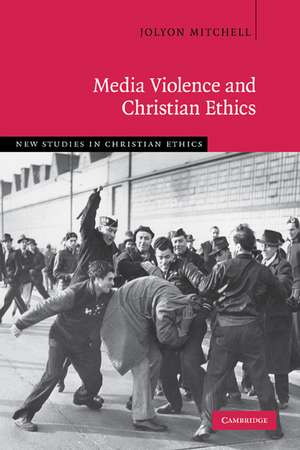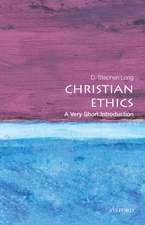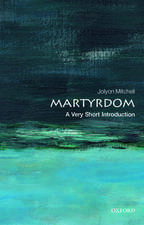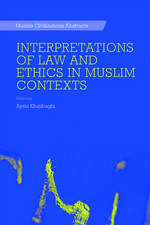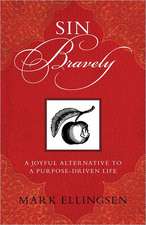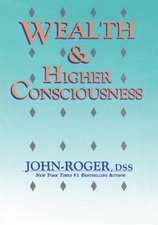Media Violence and Christian Ethics: New Studies in Christian Ethics, cartea 30
Autor Jolyon Mitchellen Limba Engleză Paperback – 17 feb 2010
| Toate formatele și edițiile | Preț | Express |
|---|---|---|
| Paperback (1) | 321.52 lei 6-8 săpt. | |
| Cambridge University Press – 17 feb 2010 | 321.52 lei 6-8 săpt. | |
| Hardback (1) | 561.51 lei 6-8 săpt. | |
| Cambridge University Press – 14 noi 2007 | 561.51 lei 6-8 săpt. |
Din seria New Studies in Christian Ethics
-
 Preț: 206.96 lei
Preț: 206.96 lei -
 Preț: 283.79 lei
Preț: 283.79 lei -
 Preț: 203.67 lei
Preț: 203.67 lei -
 Preț: 282.26 lei
Preț: 282.26 lei - 11%
 Preț: 638.22 lei
Preț: 638.22 lei -
 Preț: 200.99 lei
Preț: 200.99 lei - 11%
 Preț: 643.70 lei
Preț: 643.70 lei -
 Preț: 287.28 lei
Preț: 287.28 lei - 9%
 Preț: 593.85 lei
Preț: 593.85 lei - 9%
 Preț: 593.67 lei
Preț: 593.67 lei -
 Preț: 312.36 lei
Preț: 312.36 lei -
 Preț: 434.79 lei
Preț: 434.79 lei -
 Preț: 379.12 lei
Preț: 379.12 lei -
 Preț: 280.74 lei
Preț: 280.74 lei -
 Preț: 369.32 lei
Preț: 369.32 lei -
 Preț: 324.53 lei
Preț: 324.53 lei -
 Preț: 314.23 lei
Preț: 314.23 lei -
 Preț: 254.06 lei
Preț: 254.06 lei -
 Preț: 279.65 lei
Preț: 279.65 lei -
 Preț: 284.17 lei
Preț: 284.17 lei -
 Preț: 283.03 lei
Preț: 283.03 lei -
 Preț: 373.74 lei
Preț: 373.74 lei -
 Preț: 252.30 lei
Preț: 252.30 lei -
 Preț: 254.06 lei
Preț: 254.06 lei -
 Preț: 335.16 lei
Preț: 335.16 lei -
 Preț: 295.58 lei
Preț: 295.58 lei -
 Preț: 323.00 lei
Preț: 323.00 lei -
 Preț: 402.09 lei
Preț: 402.09 lei - 11%
 Preț: 693.51 lei
Preț: 693.51 lei
Preț: 321.52 lei
Nou
Puncte Express: 482
Preț estimativ în valută:
61.53€ • 64.00$ • 50.80£
61.53€ • 64.00$ • 50.80£
Carte tipărită la comandă
Livrare economică 15-29 aprilie
Preluare comenzi: 021 569.72.76
Specificații
ISBN-13: 9780521011860
ISBN-10: 0521011868
Pagini: 348
Dimensiuni: 152 x 229 x 20 mm
Greutate: 0.51 kg
Editura: Cambridge University Press
Colecția Cambridge University Press
Seria New Studies in Christian Ethics
Locul publicării:Cambridge, United Kingdom
ISBN-10: 0521011868
Pagini: 348
Dimensiuni: 152 x 229 x 20 mm
Greutate: 0.51 kg
Editura: Cambridge University Press
Colecția Cambridge University Press
Seria New Studies in Christian Ethics
Locul publicării:Cambridge, United Kingdom
Cuprins
Introduction: regarding media violence; Part I. Media Realities?: 1. Remembering violent news; 2. Reframing news; 3. Re-envisaging photojournalism; Part II. Media Fantasies?: 4. Reviewing violent films; 5. Reinterpreting films and video games; 6. Reappraising advertisements; 7. Redescribing media violence.
Recenzii
Review of the hardback: 'Jolyon Mitchell has written a genuinely important and ground-breaking book. Using a wide variety of evidence, and ranging widely across time and space, he explores the immensely complex relationship between Christianity and media violence. The result is a book rich in original insights, and one that combines great erudition with relentlessly probing discussion. The book deserves a very wide readership embracing, among others, theologians, sociologists, historians, and anyone interested in the contemporary media.' Dr David Smith, Faculty of History, University of Cambridge
Review of the hardback: 'In this stimulating, vivid, and constructive book, Dr Mitchell explores dimensions of the continuing Christian engagement with violence in various forms, particularly as this engagement is affected and shaped by contemporary media. This book makes an original and timely contribution to understanding not only how journalists, producers and directors depict violence, but also how audiences can develop creative, critical and peaceable practices for interacting wisely with media violence. Dr Mitchell is an outstanding practical theologian and scholar of media, religion and culture, who draws effectively on his own professional experience of the media and scholarly expertise in communication. The result is a rigorous and fascinating study which should be widely read by academics, students and practitioners who will all find that it enlarges their vision and sparks off serious debate. Media Violence and Christian Ethics is both challenging and fascinating, full of serious theological and historical reflection on significant cases.' Professor Duncan B. Forrester, Emeritus Professor of Christian Ethics and Practical Theology, The University of Edinburgh
Review of the hardback: 'There is a well-balanced and illuminating discussion on the issue whether violence on television stimulates violence in society…. a valuable stimulus to preaching that is ready to engage with contemporary life.' The Times Literary Supplement
Review of the hardback: 'There is a well-balanced and illuminating discussion on the issue of whether violence on television stimulates violence in society. … What he has to say could be a valuable stimulus to preaching that is ready to engage with contemporary life.' Church of England Newspaper
Review of the hardback: 'Mitchell's book is a brilliant and significant contribution to the emerging conversation taking place at the intersection of media studies, Christian ethics, and practical theology. Students, scholars, and thoughtful Christians interested in any one of these fields must read this book.' Mary E. Hess, Associate Professor of Educational Leadership, Luther Seminary, St. Paul, Minnesota
Review of the hardback: 'This is a perceptive and stimulating examination of violence in the many media to which we are constantly exposed. … A refreshing, humane and enthralling study.' The Right Reverend John Pritchard, Bishop of Oxford
Review of the hardback: 'In a short review it is simply not possible to do justice to the wealth of material contained in this book. In each section we are taken through detailed research findings in a way which is knowledgeable and discriminating. Not only so but the author writes in an accessible and attractive way.' John Eldridge, Emeritus Professor of Sociology, University of Glasgow
Review of the hardback: 'A refreshing, humane and enthralling study.' Insights
Review of the hardback: 'Mitchell's argument is informed throughout by a wealth of examples, but the book is also outstanding in its ability to combine a comprehensive coverage of literature in media ethics, film studies and cultural theory with a strongly sustained and nuanced theological reflection.' Theology
Review of the hardback: 'In this stimulating, vivid, and constructive book, Dr Mitchell explores dimensions of the continuing Christian engagement with violence in various forms, particularly as this engagement is affected and shaped by contemporary media. This book makes an original and timely contribution to understanding not only how journalists, producers and directors depict violence, but also how audiences can develop creative, critical and peaceable practices for interacting wisely with media violence. Dr Mitchell is an outstanding practical theologian and scholar of media, religion and culture, who draws effectively on his own professional experience of the media and scholarly expertise in communication. The result is a rigorous and fascinating study which should be widely read by academics, students and practitioners who will all find that it enlarges their vision and sparks off serious debate. Media Violence and Christian Ethics is both challenging and fascinating, full of serious theological and historical reflection on significant cases.' Professor Duncan B. Forrester, Emeritus Professor of Christian Ethics and Practical Theology, The University of Edinburgh
Review of the hardback: 'There is a well-balanced and illuminating discussion on the issue whether violence on television stimulates violence in society…. a valuable stimulus to preaching that is ready to engage with contemporary life.' The Times Literary Supplement
Review of the hardback: 'There is a well-balanced and illuminating discussion on the issue of whether violence on television stimulates violence in society. … What he has to say could be a valuable stimulus to preaching that is ready to engage with contemporary life.' Church of England Newspaper
Review of the hardback: 'Mitchell's book is a brilliant and significant contribution to the emerging conversation taking place at the intersection of media studies, Christian ethics, and practical theology. Students, scholars, and thoughtful Christians interested in any one of these fields must read this book.' Mary E. Hess, Associate Professor of Educational Leadership, Luther Seminary, St. Paul, Minnesota
Review of the hardback: 'This is a perceptive and stimulating examination of violence in the many media to which we are constantly exposed. … A refreshing, humane and enthralling study.' The Right Reverend John Pritchard, Bishop of Oxford
Review of the hardback: 'In a short review it is simply not possible to do justice to the wealth of material contained in this book. In each section we are taken through detailed research findings in a way which is knowledgeable and discriminating. Not only so but the author writes in an accessible and attractive way.' John Eldridge, Emeritus Professor of Sociology, University of Glasgow
Review of the hardback: 'A refreshing, humane and enthralling study.' Insights
Review of the hardback: 'Mitchell's argument is informed throughout by a wealth of examples, but the book is also outstanding in its ability to combine a comprehensive coverage of literature in media ethics, film studies and cultural theory with a strongly sustained and nuanced theological reflection.' Theology
Descriere
Jolyon Mitchell investigates how audiences can interact creatively, wisely and peaceably with media violence.
